2013年新版新目标英语八年级上册unit 2Section B 1
新目标英语八年级上册Unit 2 Section B (1a-1e)第三课时公开课精品课件
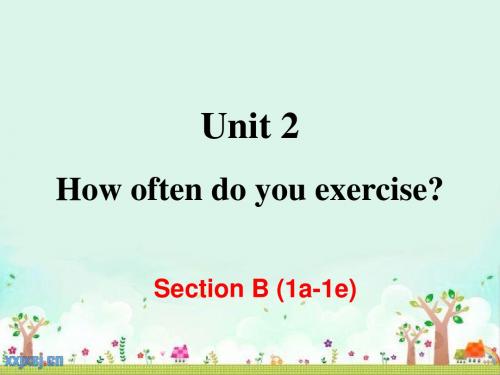
junk food
once a month
A: How often do you eat junk food? B: Once a month. A: Do you like it? B: Yes. But my mom says it’s not good for my health.
fruit every day
How often do you …?
How often do you …?
Summary
Summary
1.Key vocabulary:health,junk food, be good for 2.Target language: A:How often do you exercise? B:I exercise every day. A:And how often do you...?
Homework
• Make your conversation and write it down on your notebook. • Preview 2b.
A: How often do you eat fruit? B: I eat fruit every day. A: Do you like it? B: Yes. I like it very much. And it’s good for my health.
Consolidation
1c Listen to an interview about two people’s daily habits. Circle your answer to each question.
Tina
Bill
every day hardly ever _____________ _____________ _____________ _____________ every day never _____________ _____________ nine nine every day never _____________ _____________ _____________ two_____________ or three times a week three or four times a week never _____________ _____________ four times a day
人教版新目标八年级英语上册 Unit 2 Section B (1a--1e) 同步测试(有答案)
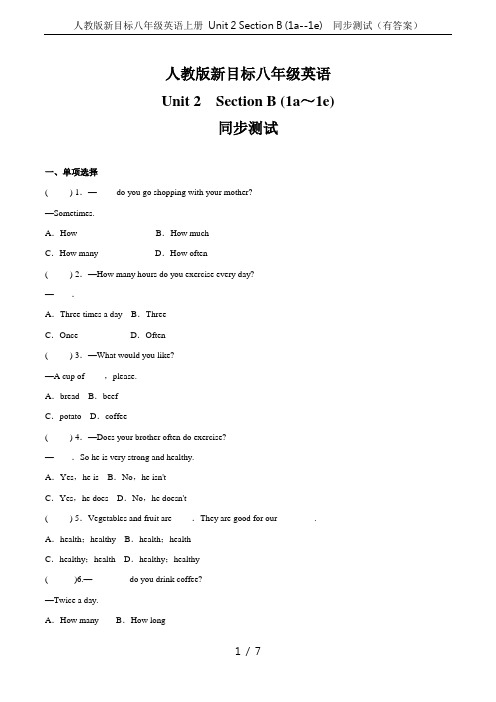
人教版新目标八年级英语Unit 2Section B (1a~1e)同步测试一、单项选择( ) 1.—____ do you go shopping with your mother?—Sometimes.A.How B.How muchC.How many D.How often( ) 2.—How many hours do you exercise every day?—____.A.Three times a day B.ThreeC.Once D.Often( ) 3.—What would you like?—A cup of ____,please.A.bread B.beefC.potato D.coffee( ) 4.—Does your brother often do exercise?—____.So he is very strong and healthy.A.Yes,he is B.No,he isn'tC.Yes,he does D.No,he doesn't( ) 5.Vegetables and fruit are ____.They are good for our ________. A.health;healthy B.health;healthC.healthy;health D.healthy;healthy( )6.—________ do you drink coffee?—Twice a day.A.How many B.How longC.How soon D.How often( )7.—How many hours do you spend on your homework after school? —________.A.Once a day B.OneC.First D.Once( )8.Eating fruit and vegetables ________ our health.(阿凡题:1073815) A.is good to B.is good at C.is good for D.is good with( )9.—Jenny,I need some milk.—OK,Mom.________ do you need?A.How much B.How manyC.How often D.How long( )10.—Does she eat hamburgers very often?—________.She dislikes them.A.Yes,she is B.No,she isn'tC.Yes,she does D.No,she doesn't( )11.My mother wants me ________ milk every morning.A.drink B.drinkingC.to drink D.to drinking( )12.—Does your father like sports?—________.He is very healthy.A.Yes,he is B.No,he isn'tC.Yes,he does D.No,he doesn't( )13.—Would you like some ________?—Yes,please.I like drinking it.A.rice B.fishC.coffee D.noodles( )14.English is my favorite subject,and I am good ________ it. A.for B.atC.of D.to( )15.—How many hours do you exercise every day?—________.A.Three times a day B.ThreeC.Once D.Often二、词汇运用A) 根据句意及汉语提示填写单词。
2013年秋新版新目标八年级上册Unit 2 section B

How are your eating habits?
activities Eat vegetables Eat fruit Drink milk Eat junk food Drink coffee Every Three or Once or day four times twice a a week week never
practice spoken English sing English songs watch English programs write English diaries listen to English tapes
the best English student
I think …is the best English student. …’s English is pretty good. ...is very active in class. After class, … His/her good habits help him/her get good grades. As for me, I read English …
How often do you exercise? How often do you eat vegetables? How often do you eat fruit? How many hours do you sleep every night? How often do you drink milk? How often do you eat junk food? How often do you drink coffee?
4. sleep 5. drink milk 6. eat junk food
7. drink coffee
人教新目标八年级英语上册教案Unit 2 Section B
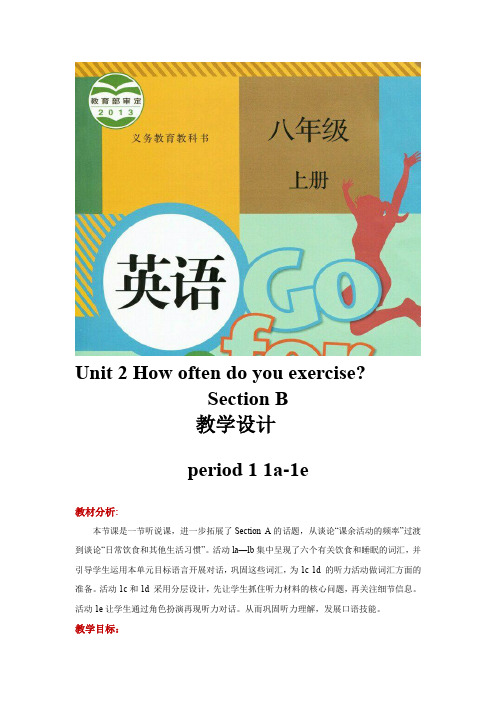
Unit 2 How often do you exercise?Section B教学设计period 1 1a-1e教材分析:本节课是一节听说课,进一步拓展了Section A的话题,从谈论“课余活动的频率”过渡到谈论“日常饮食和其他生活习惯”。
活动la—lb集中呈现了六个有关饮食和睡眠的词汇,并引导学生运用本单元目标语言开展对话,巩固这些词汇,为1c-1d 的听力活动做词汇方面的准备。
活动1c和1d 采用分层设计,先让学生抓住听力材料的核心问题,再关注细节信息。
活动1e让学生通过角色扮演再现听力对话。
从而巩固听力理解,发展口语技能。
教学目标:1.掌握以下单词:junk,junk food,coffee,health。
2.了解其他同学的日常生活情况,让学生们知道应如何安排自己的日常生活,向其他有良好生活习惯的学生学习,做一个有良好习惯的人。
教学重难点:重点:掌握本课时出现的生词及表达方式。
难点:听力训练,提高综合听说能力。
课前准备:1.总结整理以前学过的食物的图片。
2. 了解部分学生的日常饮食和其他的生活习惯。
3.准备好录音机、制作多媒体课件及学案。
教学过程:Step l: Lead-in1.Free talkT: How to keep healthy?S1: a healthy dietSleep wellExercise moreT: Do you have a healthy diet?Do you often eat junk food?2. Show students some pictures of food or drink on the screen.3. Students read the words and then discuss if they are healthy or unhealthy.4. Writes them on the blackboard.【设计意图】帮助学生复习相关词汇,唤起学生已有记忆。
2013版新目标英语八年级上教学讲义Unit-2

新目标教学讲义八年级上Unit 21.exercise v. 锻炼n. 锻炼,练习(不可数名词)exercise = do exercise do morning exercise 晨练do much exercise 做大量练习2.homework 家庭作业housework 家务schoolwork 学业不可数名词do much housework = do lots of housework 做大量家务活3.hard : adj. 坚硬的,辛苦的adv. 努力地hardly : adv.几乎不,本身表否定意思,和hard没有关系Ex. He hardly does any housework at home.hardly ever : 几乎不= hardly4. once 一次once a week 一周一次once a month 一月一次twice 两次twice a week 一周两次n. 时间,不可数名词time Ex. I have lots of time to do my homework. 频率副词短语n. 次数, 可数名词, 表做某事次数三次或以上用timethree times a week 一周三次many times 许多次Ex. I went to the park many times .every day 每天every week 每周5. two or three times a week 一周两三次once or twice a week 一周一两次three or four times a month 一月三四次three to five times a week 一周三到五次到to或or6. use the Internet 用互联网, 动词短语use of the Internet 互联网的使用,名词短语on the Internet 在互联网上surf the Internet 上网冲浪7. program = programme n. 节目Ex. What program do you like best ? = What’s your favorite program ?favorite … = like… best 最喜爱的8.adj. 满的be full of …充满了= be filled with…full Ex. The bottle is full of water.adj. 饱的--- hungry adj. 饥饿的Ex. I’m full . 我吃饱了.9.maybe : adv. 或许,大概may be : 情态动词may+be , 可能是…Ex. Maybe he is a teacher. = He may be a teacher.10.at least 至少Ex. He sleeps for at least eight hours a day .He exercises at least twice a day.at most 最多11. junk food 垃圾食品fast food 快餐12. coffee 不可数名词13. health n. 健康healthy adj. 健康的---- unhealthy adj. 不健康的healthily adv. 健康地in good health = healthy 健康的keep/ stay in good health = keep / stay healthy 保持健康a healthy breakfast a healthy lifestyle 健康的生活方式eat healthily 饮食健康14. the results of ……的结果as a result 结果Ex. As a result , he passed the exam .15. 百分数表达法:基数词+ percent ( 没有复数形式)20% twenty percent百分数做主语时,谓语动词单复数形式看百分数后的名词单复数来定.Ex. Fifty percent of the food goes bad.Fifty percent of the vegetables go bad.16. although= though 虽然,不与but连用Ex. Although my grandma is old, she looks very strong and healthy.= My grandma is old , but she looks very strong and healthy.17. through 内部穿过across 表面横过over 越过18. n. 心智,头脑,思想(不可数名词)mindv. 介意mind doing sth 介意做某事mind sb’s doing sth 介意某人做某事Never mind . 一点不介意.19. such a / an +形+ 名词单数Ex. That’s such a beautiful photo .such +形+ 名词复数/ 不可数名词Ex. This is such nice food.so +形Ex. This food is so nice .20. die v. 死亡death n. 死亡died adj. 死亡的die --- dying 现在分词lie --- lying21. writer n. 作家--- write v. 写22. however 然而whatever 无论什么23. than 比, 比较级标志24. more than 多于= over ---- less than 少于25. 频率副词:用于be / 情态动词/ 助动词后,实义动词前always 100% usually 80% often 30-50% sometimes 10-20% hardly ever 5% never 0%总是通常经常有时几乎不从不26. sometimes = at times ( 句末) 有时27. how often : 多久一次,对频率副词和频率短语提问.Ex. How often do you go shopping ?I go shopping once a week .How often does he exercise ?He often exercises.how long : 1) 多久,对for+一段时间提问2) 多长,对物体长度提问Ex. How long did you stay in shanghai ?I stayed in Shanghai for five days.How long is your desk ?It’s one meter.how soon : 多久,对in+一段时间提问,用于将来时Ex. How soon will you come back?I will come back in three days .how many + 名词复数: 多少,对数量提问how much + 不可数名词:多少,对数量提问how much : 多少钱,对价钱提问how far: 多远,对两地间的距离提问Ex. How far is it from your home to school ?It’s 5 miles .how many times : 多少次,对次数提问Ex. How many times have you been to Beijing ?I have been to Beijing twice.28. go shopping = do some shopping 去购物29. adj. 免费的Everything is free here .freeadj. 有空的= have time ---- busy 繁忙的Are you free this Monday ? = Do you have time this Monday ?in on e’s free time 在某人的空闲时间30. how come = why 为什么Ex. How come you didn’t tell me about it ? = Why didn’t you tell me about it ?31. have … lesson 上…课Ex. We are having English lesson .32. What kind of …什么种类的…?33. be busy doing sth 忙于做某事be busy with sth 忙于某事34. want to do sth 想要做某事want sb to do sth 想要某人做某事35. be good for …对…有好处Ex. We all know that milk is good for our health .be bad for…对…有害处Ex. Smoking is bad for our health .be good at …= do well in …擅长于…Ex. He is good at English . = He does well in English .be good with …与…相处的好Ex. He is good with everyone in our class .36. ask sb about sth 问某人关于某事ask sb for sth 向某人要某物Ex. We shouldn’t often ask our parents for money .ask sb for help 向某人求助Ex. You should ask the police for help.ask sb to do sth 让某人做某事ask sb not to do sth 让某人不要做某事37. be about sth 关于…Ex. Here is the results about their free time activities.38. here 位于句首的句子要用倒装.Here are the results . 完全倒装Here is +名词单数.Here are + 名词复数.Here you are . 部分倒装.39. find that + 从句Ex. He found that no one could answer the question .find + 宾语+ 形/ 名/ doingEx. He found the room dirty .I found him a good boy .I found her standing at the door.find it + 形+ to do sth 发现做某事是…形式宾语真正宾语Ex. I found it difficult to learn math well.find it +形+for sb to do sth 发现对于某人来说做某事是…Ex. I found it difficult for me to learn English well.40. not … at all 一点也不Ex. I don’t know it at all.Not at all. 别客气,回答Thank you .41. do sth for fun 做某事取乐Ex. We can play computer games for fun .42. the answer to the question 问题的答案the key to the door 门的钥匙the ticket to……的票the solution to the problem 问题的解决办法43. It’s +形+to do sth . 做某事是…It’s +形+ to do sth . 对于某人来说做某事是…Ex. It’s easy ( for me ) to carry it .44. The best way to do sth is …做某事最好的方法是…Ex. The beast way to learn English well is reading .45. spend + 钱/时间( in ) doing sth 花费…做某事spend + 钱/ 时间on sth 在…花费…spend time with sb 与某人一起度过Ex. I spent weekends with my family .46. start to do sth / start doing sth 开始做某事47. be smart about …对…明智Ex. You are smart about your health most of time.48. almost 几乎, 用于助动词/ 情态动词/ be 之后,实义动词前.Ex. I almost forget his name.49. How many percent of … ? 百分之多少…?Ex. How many percent of the students exercise every day ?50. eating habits 饮食习惯studying habits 学习习惯51. worry v. 担心,担忧worried adj. 担忧的worry about …= be worried about …担心…Ex. Don’t worry your daughter . = Don’t be worried about your daughter.。
人教版新目标八年级上册英语unit2How often do you exercise Section B(1a-1e)课时作业(含答案)
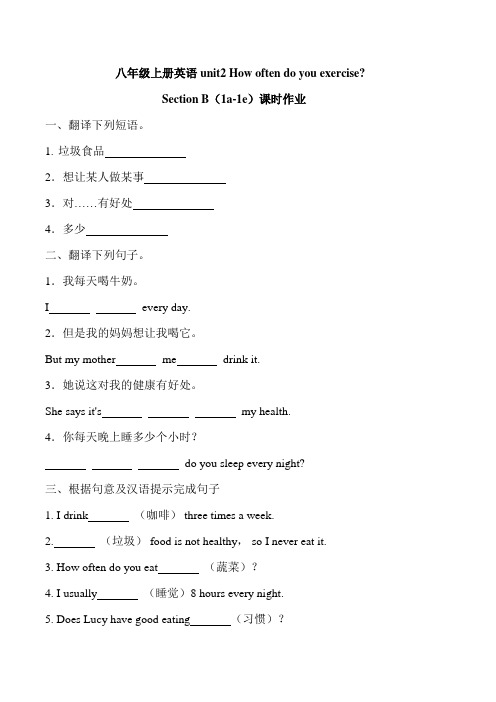
八年级上册英语unit2 How often do you exercise?Section B(1a-1e)课时作业一、翻译下列短语。
1.垃圾食品2.想让某人做某事3.对……有好处4.多少二、翻译下列句子。
1.我每天喝牛奶。
Ievery day.2.但是我的妈妈想让我喝它。
But my mothermedrink it.3.她说这对我的健康有好处。
She says it'smyhealth.4.你每天晚上睡多少个小时?do yousleep every night?三、根据句意及汉语提示完成句子1. I drink(咖啡) three times a week.2.(垃圾) food is not healthy, so I never eat it.3. How often do you eat(蔬菜)?4. I usually(睡觉)8 hours every night.5. Does Lucy have good eating(习惯)?四、完成句子。
1.我每周购物三四次。
I go shoppinga week.2.我的爸爸经常在晚上上网。
My father usuallyat night.3.我认为保持健康最好的方式是喝牛奶。
I think the best way to keep healthy is .4.他有好的学习习惯吗?Does he have good ?5.也许是好习惯帮我得到好的睡眠。
good habits help me .五、短文填空。
阅读短文,根据短文内容及首字母提示补全单词,使短文意思完整、通顺。
Mr Chen is a teacher. He 1. agets upearly in the morning. He runs forabout an hour and then has breakfast. He 2. ugoestoschool by bike,but 3. she walks to school. He4.ohelpsthe students and he playsbasketball with them three or four 5. taweek. He 6. heverwatches TV becausehe's very busy. He 7. nlets the students eatjunk foodbecause it's bad 8. fhealth. Thestudents all love him, 9. ahe isvery strictwith them. He is very tired 10. eday, but he is really happy.六、补全对话从方框中选择最佳选项完成对话,有两项多余。
人教新目标八年级上册英语Unit2课文翻译

人教新目标八年级上册英语Unit2课文翻译人教新目标八年级上册英语Unit 2 课文翻译Unit 2 Section A 1c 部分翻译Language Goal: Talk about how often you do things语言目标:谈论做事频率What do you usually do on weekends?你周末通常做什么?I often go to the movies.我经常去看电影。
1c Practice the conversation in the picture above. Then make your own conversations about what you do on weekends.1c练习上图中的对话。
然后编一个你自己的关于周末做什么的对话。
A:What do you do on weekends?A:你周末做什么?B:I usually watch TV.B:我通常看电视。
A:Do you go shopping?A:你去购物吗?B:No,I never go shopping.B:不,我从不去购物。
Unit 2 Section A 2c部分课文翻译How often do you do these activities? Fill in the chart and then makeconversations.你多长时间做一次这些活动?填表格然后做对话。
A:How often do you watch TV?A:你多长时间看一次电视?B:I watch TV every day.B:我每天都看电视。
A:What's your favorite program?A:你最喜欢的节目是什么?B:Animal World.B:《动物世界》。
A:How often do you watch it?A:你多长时间看一次这个节目?B:Twice a week.B:每周两次。
新目标英语八年级上册第二单元section b第一课时教学设
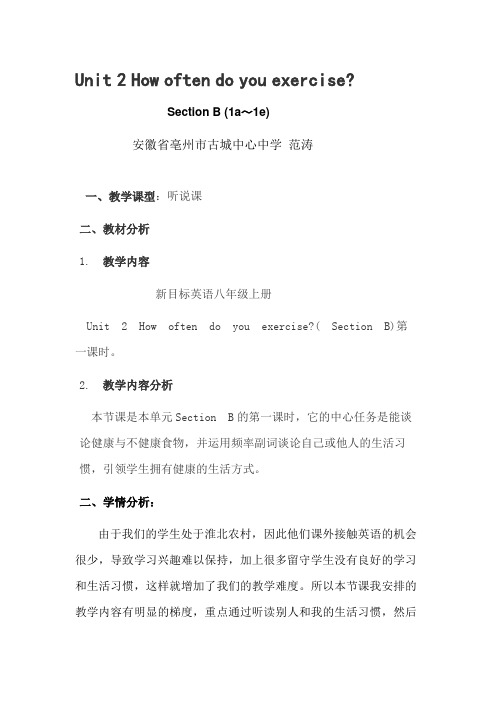
Unit2How often do you exercise?Section B (1a~1e)安徽省亳州市古城中心中学范涛一、教学课型:听说课二、教材分析1.教学内容新目标英语八年级上册Unit 2 How often do you exercise?( Section B)第一课时。
2. 教学内容分析本节课是本单元Section B的第一课时,它的中心任务是能谈论健康与不健康食物,并运用频率副词谈论自己或他人的生活习惯,引领学生拥有健康的生活方式。
二、学情分析:由于我们的学生处于淮北农村,因此他们课外接触英语的机会很少,导致学习兴趣难以保持,加上很多留守学生没有良好的学习和生活习惯,这样就增加了我们的教学难度。
所以本节课我安排的教学内容有明显的梯度,重点通过听读别人和我的生活习惯,然后学会初步介绍和描述自己的生活习惯,区分健康和非健康的生活习惯,养成自己的良好生活习惯。
三、教学目标:1.语言知识:1)学习新单词和词组:1.coffee2.health3.junk food4.junk food5.be good for sb.对……有好处6.want sb. to do sth.想要某人做某事2)学习谈论健康问题,掌握目标语言:7.—How often do you exercise?你多久锻炼一次?—I exercise every day. 我每天锻炼。
2.语言技能:1)学生能对听力材料进行判断分析,抓住关键词。
2)学生能比较灵活地使用新学习的词汇及句型。
3)学生能谈论自己及他人的生活方式。
3.学习策略:学生通过小组活动学会与人合作,通过游戏提高学生学习兴趣,通过谈论健康问题,引领学生拥有健康的生活方式,通过采访培养学生写作能力。
4.情感态度:学生能通过了解哪些食物是健康食物,哪些食物是不健康食物,懂得通过饮食、锻炼等方式为自己努力营造一个健康的生活方式。
四、教学设计思路:1)本节课主要要掌握几个名词,并通过复习所学句型,完成听力任务,并进一步讨论现在中学生存在的健康问题。
2013版新目标教材八年级(上册)第二单元知识点归纳

2013版新目标教材八年级上册第二单元知识点归纳Unit 2 How often do you exercise?一、词组、短语:1、help with housework 帮助做家务活,2、go shopping 购物,3、on weekends 在周末,4、how often 多久一次,5、hardly ever几乎不,6、once a week 每周一次,7、twice a month每月二次,8、go to the movies去看电影,9、every day 每天,10、use the Internet上网/用网,11、be free有空,12、have dance and piano lessons 上舞蹈钢琴课,13、swing dance摇摆舞14、play tennis 打网球,15、stay up late熬夜,16、at least至少,17、go to bed early 早睡,18、 play sports 锻炼身体,19、be good for 对…有好处,20、go camping去野营,21、in one’s free time在某人的空闲时间,22、not….at all 根本不,23、the most popular 最流行,24、such as例如,25、go to the dentist去看牙医,26、more than 超过/多于,27、Old habits die hard.旧习惯难改。
28、 hard=difficult 困难的,29、less than 少于/不到二、重要句子(语法):What do you usually do on weekends?你周末通常做什么? I always exercise.总是锻炼身体。
What do they do on weekends?他们周末干什么? They often help with housework.他们经常帮助干家务活。
英语新目标八年级(上)Unit2 Section B 1课件

Conservation 3 Mary: What’s the matter,Julie ?
Julie: I’m ______. thirsty Mary: You should ___________. have a drink Julie: I guess you’re right. Mary: And you shouldn’t eat any more dumplings.
2a Listening
Problem Gina Should Shouldn't
go to bed tired early Tony listen to stressed out some music have a Julie thirsty drink eat an Alan hungry apple
below.
1. b tired
2. __ hungry c
3. __ thiห้องสมุดไป่ตู้sty d
4. __ stressed out a
1b. Match the advice with the pictures below. 1. __Eat an apple. a 2. __Go to bed early. d 3. __Drink some water. 4. __Listen to music. b c
4. A: He has a headache. B: He shouldn’t go to school. 5. A: He’s hungry. T
F B: Maybe he should talk about his work.
1a. Match the words with the pictures
Conservation 2 Bill: What’s the matter, Tony? Tony: I’m___________. stressed out Bill: You should __________________. listen to some music Tony: That sounds like a good idea. Bill: And relax, you shouldn’t study tonight. tonight. Tony: Okay. I think I’ll stop.
2013八年级上Unit 2 Section B1

habits. Circle your answer to each question.
Is Bill healthy? Yes. Is Tina healthy? Yes. No. No. I don’t know. I don’t know.
1d Listen again. Fill in the blanks in the
survey.Questins1. How often do you exercise?
Tina
every day
Bill
never nine
every day hardly ever
2. How often do you eat fruit?
3. How many hours do you sleep nine every night?
1)此句为宾语从句, says后面跟的从句
的时态必须和主句中谓语动词时态
保持一致, 都用一般现在时。 2) be good for 对……有好处
例如:
Vegetables are good for our health. 蔬菜对我们的健康有益。 Junk food are not good for our health.
New words
milk
coffee
vegetables
fruit
We sleep every day.
cola
chocolate
is good for our health.
Junk food is bad for our health.
1a Match the words with the pictures.
example
Boy: How often do you eat fruit, Tom? Tom: I eat fruit every day. How often do you eat junk food? Boy: Twice a month.
人教新目标英语八年级上 Unit 2 Section B (2a~2e) 精品课件

Conclusion (Para. 5)
Watch TV
♦ 2%—1-3 times a week ♦ 13%—4-6 times a week ♦ 85%—_e_v_e_r_y_d_a_y__ ♦ Game shows are the most popular.
Use the Internet
Watch TV
Warming-up Pre-reading While-reading Post-reading Homework
Read the passage and answer the questions.
1. What were the questions about in paragraph 1? 2. What percent of the students do not exercise at all? 3. What percent of the students use the Internet every day? 4. How often do most students watch TV? What do they
A. Survey results of watching TV. B. Survey introduction. C. Survey results of exercising. D. Opinions and advice. E. Survey results of going online.
➢ How do you get the main ideas? ➢ Do you still remember the skimming strategy?
WWhhiliel-er-eraedadiningg Post-reading Homework
2013版新目标八年级上册英语Unit2period1精品课件下载

She hardly ever exercise after school.
Tell us about him/her like that. always>usually>often>sometimes
>hardly ever(几乎没有) >never
play soccer
does exercises
Free talk
do you …? does he/she…?
• every day/night
每天/每夜
• once a week/month
一周/一个月一次• twice a we源自k/month一周/一个月两次
• three times a week/month 一周/一个月三次
2 a Listen. Cheng Tao is talking about how often he does these activities. Number the activities you hear[1-5] .
Activities
How often
a.___ go to the movies b. ____watch TV c. _____shop d. _____exercise e. ______read
1b
Listen and write the letters from the picture above on the lines below.
always(100%)____ usually_______ often______ sometimes_______ hardly ever______ never(0%)_____
Jack: Well, how about Tuesday?
- 1、下载文档前请自行甄别文档内容的完整性,平台不提供额外的编辑、内容补充、找答案等附加服务。
- 2、"仅部分预览"的文档,不可在线预览部分如存在完整性等问题,可反馈申请退款(可完整预览的文档不适用该条件!)。
- 3、如文档侵犯您的权益,请联系客服反馈,我们会尽快为您处理(人工客服工作时间:9:00-18:30)。
According to the article and the pie 2d charts, write sentences with the percentages using always, usually or sometimes.
1. 90%:__________________________ Ninety percent of the students __________________________ always use the Internet. 2. 85%: __________________________ Eighty percent of the students __________________________ always watch TV. 3. 45%: Forty-five ____________________________ percent of the students ___________________________ usually exercise.
Three. __________________________________ 2. What is the best way to relax? __________________________________ The best way to relax is through exercise.
5. Do you think the students in No. 5 are healthy? _________________________________ No, I don’t think so. Why or why not? Because most students use Internet or _________________________________ watch TV on their free time. They don’t _________________________________ like exercising. It’s unhealthy. _________________________________
Do you like it?
No. But my mother wants me to drink it. She says it’s good for my health.
Байду номын сангаас
How often do you eat junk food?
I eat it once a week.
Do you like it?
go camping in the country
television
body
online
mind
together
Let’s do a survey.
What do you do in your free time? Doing exercise, use of the Internet or watching TV?
I exercise every day.
How often do you exercise?
How often do you eat fruit? …
I never exercise. I never eat fruit. I ...
2a Rank these activities according
Tina Bill every day _____ _______ _______ _____ _____ ______ _____ _____ _____ ______ _____ ______
Questions 1. How often do you exercise? 2. How often do you eat fruit? 3. How many hours do you sleep every night? 4. How often do you drink milk? 5. How often do you eat junk food? 6. How often do you drink coffee?
Jim / once a week Li Ming/ twice a week
Tony/ 3 or 4 times a week
Bob /every day
Peter/ never
Li Lei/ hardly ever
How can we be healthy?
Exercise often and eat healthy food.
3. How often do most students watch TV? _________________________________ Most students watch TV every day. What do they usually watch? _________________________________ They usually watch sports, game shows. 4. What does the writer think is the best way to relax? _______________________________ Exercise. Why? __________________________________ It’s healthy for the mind and the body.
Could you tell us some healthy food?
Well. Fruit, vegetables, milk, rice and meat.
the picture below. b junk food 3. ___ e fruit 1. ___
a milk 2. ___
1a Match the words with
Answers
1. How often do you exercise? Tina: every day Bill: hardly ever 2. How often do you eat fruit? Tina: every day Bill: never 3. How many hours do you sleep every night? Tina: nine Bill: nine
1. How many percent of the students do not exercise at all? Twenty percent students. _________________________________ 2. How many percent of the students use the Internet every day? _________________________________ Ninety percent students.
be bad for 对……有坏处 e.g. Hot dog is bad for our health. 热狗对我们的健康有坏处。
1b Ask and answer questions. Use the words from 1a.
How often do you drink milk, Liu Fang? I drink milk every day.
to how often you think your classmates do them (1=most often, 6= least often). watch TV
go to the movies play computer games exercise or play sports
use the Internet
What activities do you think is healthy for the mind and the body?
Read the passage quickly and find the answer to the 2b questions below.
1. How many kinds of free time activities are mentioned in the passage?
Exercise
Use of the Internet
______ 13 % 4-6 times a week
______ 2 % 1-3 times a week
______ 85 % every day Watch TV
2c
Read the article again and answer the questions.
Yes. But my mother doesn’t let me eat it. She says it’s bad for my health.
How often do you drink/eat…?
I eat …
Do you like …?
…
1c
Listen to an interview about two people’s daily habits. Circle your answers to each question.
4. How often do you drink milk? Tina: every day Bill: never 5. How often do you eat junk food?
Tina: two or three times a week Bill: three or four times a week 6. How often do you drink coffee?
Does Tina have good habits? Yes. No. Yes. No. I don’t know. I don’t know. Does Tina have good habits?
